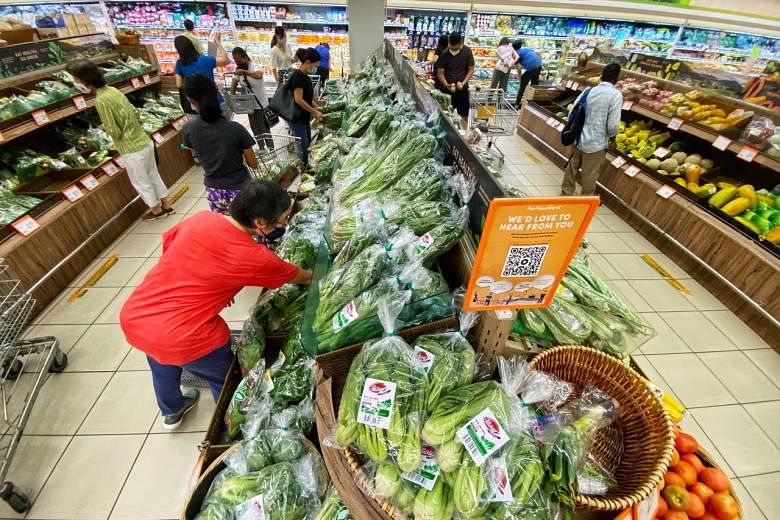SINGAPORE -Farmers in Singapore were not spared the impact of the Covid-19 pandemic, with dulled demand due to lockdowns and border restrictions last year causing a fall in local fish and vegetable production.
The amount of fish produced last year was 3,960 tonnes - the lowest since 2014, when 4,205 tonnes was produced, data on the government statistics website showed.
SingStat has made publicly available annual local production figures from 2014 to last year for most food types.
For vegetables, the 22,793 tonnes grown here last year was down from 24,296 tonnes produced in 2019 and 24,033 tonnes in 2018.
However, the productivity of farms producing hen's eggs shot up. Data showed that 616 million eggs were produced locally last year - the highest amount across seven years of data.
Dr William Chen, the Michael Fam Chair Professor and director of the Food Science and Technology Programme at Nanyang Technological University, said Singapore's highly automated egg farms could have been spared the impact of manpower shortages arising from tightened measures and quarantine restrictions amid the pandemic.
Currently, Singapore produces less than 10 per cent of its own food. But the nation has set a target to produce 30 per cent of its nutritional needs by 2030 to boost food security.
The role of local food production was thrust in the spotlight in the initial days of the Covid-19 outbreak, when fears of food shortages caused by other nations shutting their borders led to numerous panic buying sprees at supermarkets here.
But despite people rushing to supermarkets en masse on numerous occasions, there was no consistently high demand throughout the year, said the Singapore Food Agency (SFA) in response to queries.
"There was a decrease in local production of seafood and leafy vegetables largely due to farms adjusting their output due to lower sales during the Covid-19 period," an SFA spokesman told The Straits Times.
"While we observed initial surges in demand during periods of food supply disruption, it did not translate to consistent demand throughout the year."
But she added that local farms play an important role in times of disruption, noting that fish farms here stepped up production to minimise the impact of the temporary closure of the Jurong Fishery Port in July.
The fishery port was closed for two weeks to break the chain of Covid-19 transmission and enable deep cleaning after a spate of coronavirus cases were linked to it.
Mr Andreas von Scholten, chief executive of the Barramundi Group, one of Singapore's largest fish producers here, declined to provide production numbers, citing commercial sensitivity.
But he said that business to business sales were affected during the height of the pandemic, when lockdowns and travel restrictions disrupted hotels, restaurants and catering markets last year.
Mr von Scholten added: "Although Barramundi Group faced similar pressures in 2020, we have a certain degree of flexibility on production as we are able to harvest based on demand."
For instance, he said the firm's production biomass - referring to fishes in the waters - this year and last remain unchanged, as a result of production and stocking of fingerlings in earlier years.
He added: "We are well-equipped to scale up production to meet any potential surges in local demand, such as in the event of a supply disruption as illustrated by the recent Jurong Fishery Port closure, so that Singaporeans can enjoy a certain degree of self-sufficiency and food security."
A spokesman for vegetable farming company Sustenir also declined to provide production figures, but said the firm has a plug-and-play set-up which allows for quick expansion.
"At the height of Covid-19, when fresh supply from overseas was disrupted, Sustenir was fortunate to have expanded, ramping up production by about 75 per cent," she said.
Prof Chen said of the local production statistics: "We see the need and potential to enhance automation for farming to reduce reliance on manpower. This is also supported by local egg production, which was not affected by the shortage of manpower thanks to its adoption of automation in operations."
He added: "Local farmers should also be more inclined to adopt tech-driven farming so we can have more success stories like egg farms."


